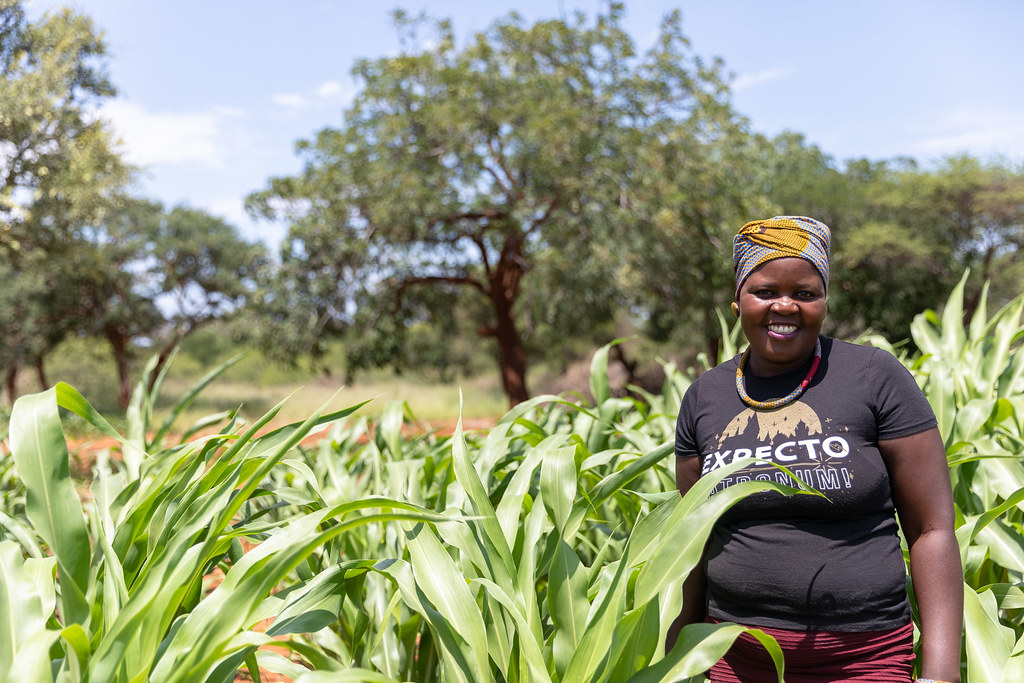Lethiwe Moyo, Lead Farmer in a sorghum field of good condition in Zimbabwe. Climate risks are a growing threat to the African agricultural sector.
Africa, more than any other continent, is disproportionately affected by climate change. The recent Intergovernmental Panel on Climate Change (IPCC) report paints a grim picture of Africa’s future, projecting heavy precipitation, flooding events, and agricultural droughts, if temperatures rise by even 1.5°C. A rise to 2.0°C would usher in agricultural and ecological droughts across the continent, severely threating food security and the achievement of Sustainable Development Goals by 2030.
Adding fuel to the fire of the climate crisis, Africa remains the least financially resilient continent, with insurance penetration at half the world average as a percentage of GDP. Premium payments lag behind global averages by 11 times, leaving the population exposed to significant risks without downside protection. This lack of resilience is a continent-wide issue that needs urgent attention.
This dramatic trend unfolds against the backdrop of limited financial resources at both national and sub-national levels. As the impacts of climate change grow and intensify, governments are forced to divert funds from sustainable development to emergency response. This unstructured approach to financial risk management has become evident, exacerbated by inadequate risk understanding, weak governance capacity, and competing priorities.
While important resources have been directed towards climate mitigation and adaptation, insurance's role in building resilience has been historically overlooked. Insurance acts as a risk-transfer mechanism, providing crucial protection against climate-related risks, helping safeguard development gains, and incentivising growth. As Africa prepares for the Africa Climate Summit and COP28, it's essential to consider insurance as a key tool in building financial resilience to escalating climate risks.
In this context, the UNDP Insurance and Risk Financing Facility (IRFF), a Sustainable Finance Hub flagship initiative, is working in 30 countries to deliver innovative protection solutions, including 11 in sub-Saharan Africa, and aims to expand to 50 developing countries by 2025. A key element of this work is the development of sovereign risk financing and inclusive insurance solutions while also investing in the long-term transformation of insurance markets, and the capacity of countries to financially manage risk for the long-term.
However, affordability remains a challenge for governments, businesses and individuals, along with limited understanding of risk, uneven financial literacy, and lack of insurance industry capacity. This has been further exacerbated by fiscal and economic pressures in vulnerable African countries. The limited adoption of insurance solutions leads to a insufficient diversification of risk, increasing capital and operational costs, and higher premiums, hindering vulnerable countries' ability to benefit from insurance protection. UNDP’s IRFF is involved in multiple projects across the continent to support communities building financial resilience.
Flooding is a significant risk in Nigeria, affecting many states and worsening socio-economic conditions for the urban poor, who lack financial protection as insurance is only accessible to 0.4% of the population. In May 2023, the Lagos State Government, UNDP, the German Government, and the Insurance Development Forum launched a Flood Risk Insurance project to cover citizens against urban floods. This project focused on the development of a parametric insurance solution to ensure rapid payouts for emergency disaster relief and (re)construction of critical network infrastructures.
In Ghana, an inter-ministerial working group, together with UNDP and insurance industry partners, is developing a flood risk finance solution for the Greater Accra Metropolitan Area region (GAMA). A Flood Contingency Plan, and other policy documents have been drafted, and innovative satellite-based Flood Footprint Cover is being finalized.
In Tanzania, UNDP and IDF are working closely with the Government to develop a National Agriculture Insurance Scheme and disaster risk finance strategies. This aligns with national processes and strengthens the regulatory environment with plans to review current actuarial capacities and conducting online tutorial sessions for actuarial certification candidates.
To support these projects, the Facility has concluded insurance risk diagnostic studies in Ghana and Tanzania, providing a snapshot of challenges and opportunities for insurance and risk finance. UNDP collaborates with local partners to improve the enabling environment and develop country-specific solutions.
Additionally, Africa's least developed countries face increasing climate-related challenges and limited financial resources, and often lack the necessary technical capacity to manage risk, financially. To address these interconnected issues, the IRFF’s Engagement Initiative is building capacity for financial risk management in Comoros, Senegal, and Uganda through capacity development, policy development support, and research.
Amidst the mounting climate challenges that disproportionately threaten Africa, the integration of insurance and risk finance into the heart of development, including premium financing and providing affordable solutions, has never been more critical. By harnessing these tools, Africa can not only build resilience against the looming climate risks, but also pave the way towards a sustainable future.

